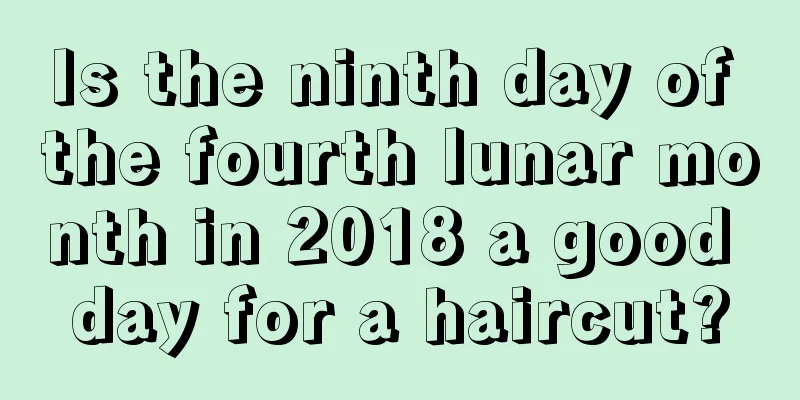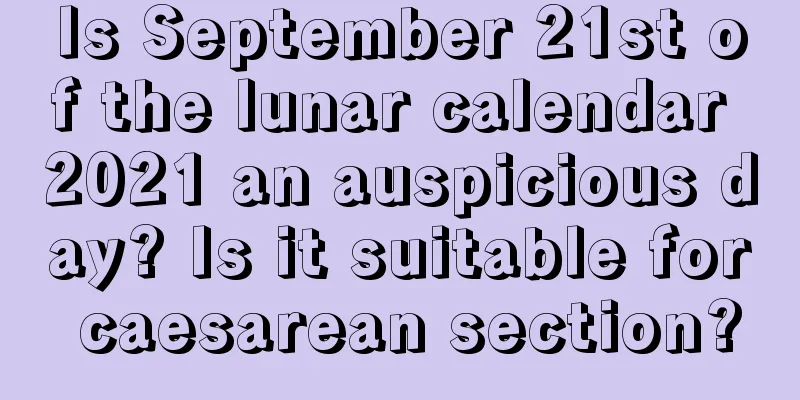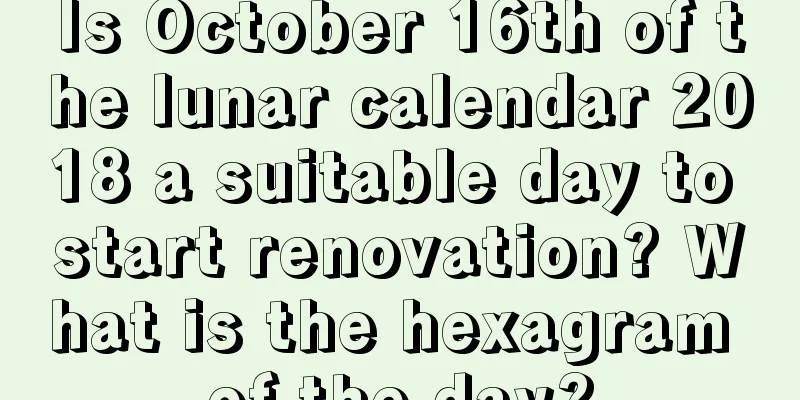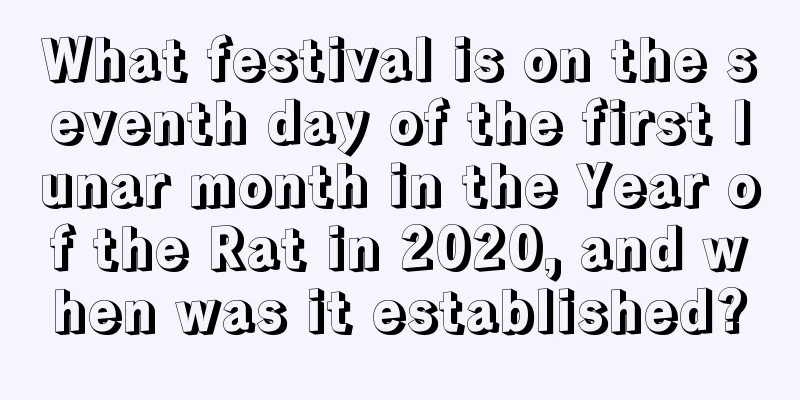What are the customs and etiquette for the Lunar New Year’s Eve? When is New Year’s Eve 2018?

Introduction: Time flies and it is almost the New Year's Eve of 2018. There are many customs and considerations about New Year's Eve. So what are the customs and etiquette of the Lunar New Year’s Eve? When is New Year’s Eve 2018? Time has unknowingly come to the end of the year. Fortune Teller.com has prepared some information about the 2018 Chinese New Year's Eve. Click in to learn more!What are the customs and etiquette for the Lunar New Year’s Eve?New Year's Eve customs: New Year's Eve dinner <br /> The New Year's Eve dinner is also called the reunion dinner. According to the records of Zong Yan's "Jingchu Sui Shi Ji", the custom of eating New Year's Eve dinner has existed at least since the Southern and Northern Dynasties. Because it is winter, people in the north often set up a hot pot in the middle of the dining table, so it is also called "weilu".New Year's Eve customs: traditional seating arrangement <br /> According to old customs, the traditional seating arrangement on New Year's Eve is "the left is more respected, the east is more respected", and "facing the door is more respected". The chief seat at the annual banquet is the elder with the highest seniority, and the last seat is the one with the lowest seniority. If it is a dinner party, the chief guest is the most respected guest and the host sits at the last seat. Before the chief takes his seat, no one else can take his seat; before the chief takes action, no one else can take action. New Year's Eve customs: Food features <br /> The dishes for the New Year's Eve dinner of northerners often include dumplings, fish, rice cakes, long-year-old vegetables, etc. Because dumplings are shaped like gold ingots, they symbolize wealth; the fish dish cannot be finished because in Chinese, "fish" and "surplus" have the same pronunciation, which has the auspicious meaning of "surplus every year"; rice cakes mean "promotion every year"; and eating longevity dishes implies longevity. In South China, there are more chicken, roast pork, hair algae, dried oysters, etc., because "hair algae and dried oysters" is a homophone for "make a fortune and have a good market." A typical New Year’s Eve dinner in Jiangnan must include fish and a hearty soup pot. New Year's Eve customs: pasting Spring Festival couplets<br /> Spring Festival couplets, also known as "door couplets", "spring stickers", "couplets", and "couplets", are a type of couplets and a unique literary form. This pair of the world's earliest Spring Festival couplets, "The three yangs begin to spread, the four seasons begin to open", is recorded on the Dunhuang manuscripts unearthed from the Mogao Grottoes. The couplet was written by Liu Qiuzi of the Tang Dynasty in the 11th year of Kaiyuan (723). The custom of pasting Spring Festival couplets during the Spring Festival began to become popular among the people in the Ming Dynasty, and the trend originated in Nanjing. Nowadays, people in the Jiangnan region pay attention to pasting Spring Festival couplets on the morning of New Year's Eve. New Year's Eve customs: Ancestor worship <br /> According to Chen Jing, a folklore expert and director of the Folklore Art Research Office of Nanjing University, ancestor worship is the first major event on New Year's Eve. In many places in our country, on this day, people will set up sumptuous meals at home, light incense and candles, and the head of the family will lead their children and grandchildren to kowtow. In some rural areas in the north, people still burn paper money at home. In the evening of New Year's Eve, the whole family lights incense and candles, pours fine wine, and places dishes in front of the ancestral portraits, and holds a grand sacrificial ceremony to express the sentiment of "respecting the dead and remembering the ancestors." People start to enjoy their meal only after their ancestors have finished their New Year’s Eve dinner. New Year's Eve Customs: Pasting the Chinese Character "Fu" <br /> Pasting the Chinese Character "Fu" during the Spring Festival is a long-standing custom among the Chinese people. Pasting the word "Fu" during the Spring Festival reflects people's yearning for a happy life and is also a wish for a better future. There is no uniform standard for how to paste the word "Fu": New Year's Eve customs: The custom of staying up all night to welcome the new year has a history of nearly two thousand years in China. Zhou Chu of the Jin Dynasty talked about the New Year customs in Shu in his "Fengtu Ji". At the end of the year, people gave each other New Year gifts, which was called "gifting the year"; they invited each other to banquets, which was called "saying goodbye to the year"; and they stayed up all night on New Year's Eve, which was called "keeping the year". This is the earliest record of the custom of staying up all night to see on New Year's Eve. But at that time, staying up all night to celebrate the New Year seemed to be a local custom. After the Sui and Tang Dynasties, staying up all night to celebrate the New Year became a common custom throughout the country. When is New Year’s Eve 2018?The date of New Year's Eve 2018: February 15, 2018, Thursday, the 30th day of the twelfth lunar month, also known as New Year's Eve, New Year's Eve, New Year's Eve, and Suichu. It is the last night of the twelfth month of the lunar calendar every year. "Chu" means to remove; "xi" refers to night. New Year’s Eve is a festival for bidding farewell to the old and welcoming the new, starting a new year and bringing renewal to everything. Along with Qingming Festival, Zhongyuan Festival and Double Ninth Festival, it is China's traditional festival for ancestor worship, and is also a traditional cultural festival popular in countries in the Chinese character cultural circle.Summary: The above content is about [What are the customs and etiquette of the Lunar New Year’s Eve? When is New Year’s Eve 2018? 】Problem analysis, hope it can help everyone! |
>>: When will we celebrate New Year’s Eve in 2018? What are the taboos on New Year's Eve?
Recommend
Is it possible to get married during the Frost Descent solar term in 2021? Is the Civil Affairs Bureau open on the day of Frost's Descent?
The weather starts to get colder with the Frost De...
Analysis of the second day of the third lunar month in 2022. Is it a good time to burn incense and pray for blessings on that day?
The benefits of praying every day are different on...
Is it a good idea to hold a funeral on the 25th day of the second lunar month in 2019?
The heavy coffin, coupled with the huge coffin cov...
Is it possible to get engaged on the fourth day of the seventh lunar month in 2021? What to prepare for engagement?
The bright moon hangs over the dark sky, and the v...
Is it a good idea to get married on October 8, 2020, the Minor Snow Festival? What is the Minor Snow solar term?
Introduction: You need to choose an auspicious day...
Is it auspicious to sign and open a business on November 13, 2018 in the lunar calendar?
In addition to the winter month, the eleventh mont...
Is the fifth day of the ninth lunar month in 2018 suitable for signing a contract?
Is the fifth day of the ninth lunar month in 2018 ...
Do girls born on the Autumnal Equinox in 2021 have good luck? What is the fate of a girl born on the Autumnal Equinox?
The Autumnal Equinox is a time of clear and cool w...
Is it appropriate to move house on May 21st of the lunar calendar in 2020?
Is it appropriate to move house on May 21st of th...
Is Qingming Festival based on the Gregorian calendar or the lunar calendar? What are the activities for Qingming Festival?
Qingming Festival is also one of the traditional f...
What are the customs of the Ghost Festival? What are the taboos during the Ghost Festival?
China is a country with a profound cultural histor...
Is it appropriate to get married or engaged on the fourth day of the first lunar month in the Year of the Rat in 2020? Auspicious dates for weddings!
Marriage and engagement are both major events in ...
Is it a good date to hold a funeral on April 23rd of the lunar calendar in 2019? What is the hexagram like today?
Introduction: Funeral is an important event, so an...
Aquarius Horoscope Analysis for New Year's Day 2022
Aquarius' fortune is different at different ti...
Is it possible to get engaged or married on the 29th day of the first lunar month in 2018?
What day is the 29th day of the first lunar month...









